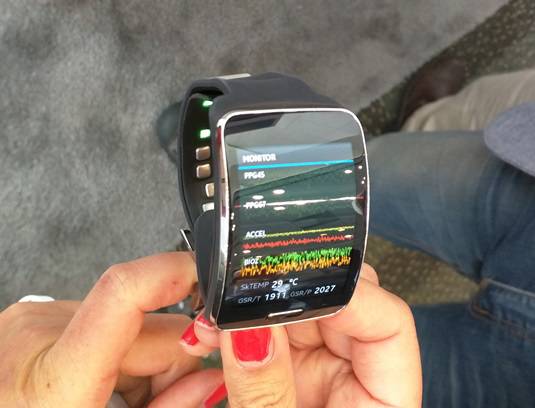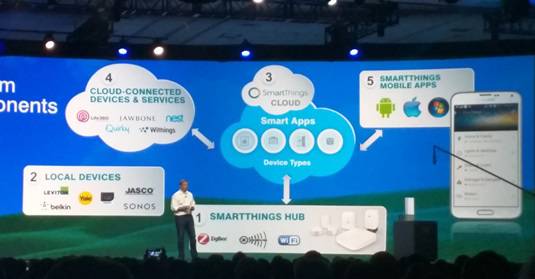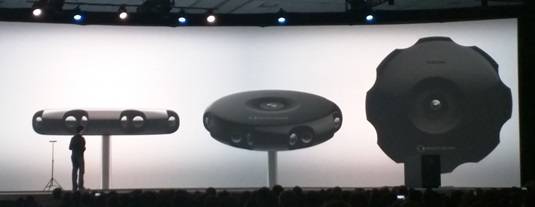This article is more than 1 year old
Samsung: Every breath you take, every step you make, we'll be watching
Virtual reality cams and wristwatches that phone home your health stats
Developer conference Samsung really wants to be a key player in the much ballyhooed internet-of-things, but admits it can't do the job alone.
It needs software developers to come up with ways to draw people into IoT – and has been showing off hardware it hopes someone will write some apps for.
During the opening keynote of the Samsung Developers Conference in San Francisco on Wednesday, Won-Pyo Hong, the tech giant's president, said no one company will have the perfect solution for dominating the IoT world; it's down to programmers to build apps people will accept into their homes – apps that'll monitor them within an inch of their lives.
Samsung is concentrating on four areas in the next year: healthcare, smart homes, wearable devices, and virtual reality.
On the healthcare front, Sammy showed of the latest build of its Simband body-monitoring hardware, first shown off in May. It looks very much like a Samsung Gear smartwatch, but with a row of sensors built into the wrist strap that measures heart rate, perspiration, and blood pressure – and it tells you the time as well.

Every breath you take, every step you make ... Samsung's Simband
On the software side, Samsung has released an SDK for the Simband. There's a limit to what coders can do with this at the moment, since the US Food and Drug Administration hasn't cleared the device for use yet.
A quick glance at the terms and conditions inside the Simband box showed that any information collected by the watch and stored in SAMI (Samsung Architecture Multimodal Interactions) is the property of the owner, unless they elect to share it – but Samsung reserves the right to use the anonymized data for "the advancement of research in Digital Health."
Samsung's ambitions to get its foot in the door of connected homes are being carried forward by SmartThings, the home automation firm it snapped up in August. Linking up light bulbs, thermostats, and alarms will all be done via a SmartThings hub and a newly released SDK.

All your homes are belong to us
SmartThings founder Alex Hawkinson said the platform will be manufacturer agnostic, but the firm has the software in place to allow a full range of control from a smartphone. There's also voice control: saying "goodbye" to the hub as you leave the house will cause it to automatically shut down non-essential systems.
On the wearables front, Samsung gave details of the forthcoming upgrade to its Gear S smartwatch. The new wristputer will incorporate Wi-Fi, Bluetooth, and 3G connectivity. Samsung didn't mention battery life, but with that spec, we hope it lasts longer than a hummingbird's fart between recharges.
The firm also announced a partnership with tennis racket maker Babolat. Its CIO Jean-Marc Zimmerman said the popularity of tennis was waning among the youth of today, but smart rackets that measure power and grip may inspire more youngsters to start playing with their balls.
Finally, Samsung is making a very big play for the virtual reality market, thanks to a partnership with Oculus. From Wednesday, developers can order the Oculus Gear Innovator’s Edition headset – virtual-reality goggles made for developers – provided they have a Galaxy Note 4 to feed it with graphics.

Reg hack wishing someone had developed a Parisian brothel circa 1800 simulation
Having tried out a Pacific Rim simulation and virtual safari on the headset, your humble hack was impressed with the smoothness of the motion – there's no sign of the regurgitation-inducing lag and flakiness that marred earlier Oculus hardware. But until the resolution is sorted out, don't get your hopes up that the virtual world will be as good as the actual one.
Samsung also unveiled the first hardware system designed for what it calls Project Beyond – an attempt to dramatically increase the amount of VR content out there. The Project Beyond camera, which was kept strictly behind glass for the press, uses 16 high-definition video cams, along with another camera on top, to record material in 3D for headsets.
Samsung envisages the camera gear being installed at concerts and public beauty spots. But, as so often with virtual reality, there's a catch.

Lovely design, but tons of awkward data to handle
The virtual reality camera can certainly capture a lot of detail, but that amounts to huge volumes of data, potentially gigabytes per second. Getting that uploaded to a server and then downloaded to a headset is going to take some magic, which Samsung either doesn’t have yet, or wasn't showing off.
Clearly Sammy has great plans for the Internet of Stuff, and some interesting hardware to make it happen. But it's also hoping that the 1,300 developers at the conference, and the thousand who couldn't make it, will be able to come up with the stuff that it can't to drive those ambitions further. ®
